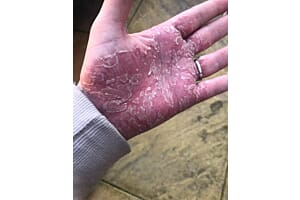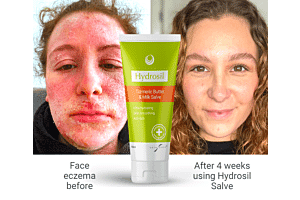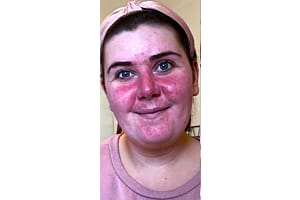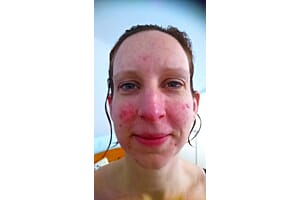Indigo Faulkner, 18, is an A Level student from Bridgenorth in Shropshire Indigo says; “When you say to friends you can’t go out because you have a cold sore, they think you’re being silly or vain. They don’t realise that for a cold sore sufferer like me, cold sores are not only very painful they are disfiguring. I can’t even smile when I have live sores and everyone stares in horror at my lips. And until I discovered a balm made form liquorice there was nothing I could find as a cold sore cure. I’ve been asked if I’ve been hit in the face or if I’ve had an accident because of how my face looks when I get a bad cold sore outbreak. I’ve heard a few people at school make more insulting comments under their breath as I have passed by. I try to ignore them but it’s hard sometimes not to let it get to you. The problem is it looks like I have an open wound on my lip. People assume all sorts of things. They don’t realise that it’s just cold sores. I’ve had cold sores since I was a little girl, I had my first one when I was five and I have been getting progressively worse and more frequent outbreaks ever since. 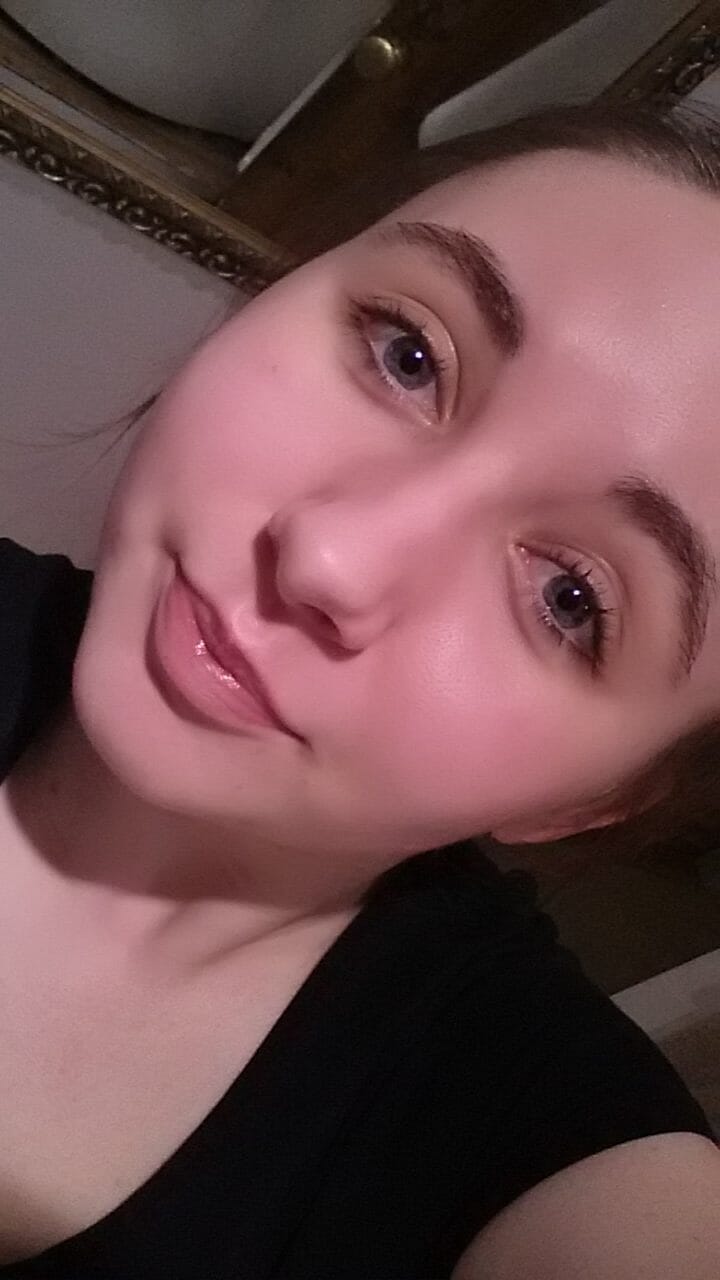 When I have a really bad outbreak they cover my whole top lip and even go up my nose. They last for about ten days. They can crack open and weep and when anything touches them they hurt. I started getting more outbreaks when I went through hormonal changes in my early teens. I was bought up in southern Spain, but we moved back to the UK five years ago and the change caused my cold sores to get worse. The colder weather and more frequent colds meant I was getting an outbreak every six to eight weeks. I also get quite bad hay fever in the summer in the UK and that triggers my cold sores too. We go back to Spain for the summer holidays and the change in temperature from the UK and the stronger sun also triggers an outbreak. I always arrive in Spain to see my old friends with my top lip covered in cold sores. It’s very depressing.
When I have a really bad outbreak they cover my whole top lip and even go up my nose. They last for about ten days. They can crack open and weep and when anything touches them they hurt. I started getting more outbreaks when I went through hormonal changes in my early teens. I was bought up in southern Spain, but we moved back to the UK five years ago and the change caused my cold sores to get worse. The colder weather and more frequent colds meant I was getting an outbreak every six to eight weeks. I also get quite bad hay fever in the summer in the UK and that triggers my cold sores too. We go back to Spain for the summer holidays and the change in temperature from the UK and the stronger sun also triggers an outbreak. I always arrive in Spain to see my old friends with my top lip covered in cold sores. It’s very depressing.  When I’m having a cold sore outbreak I feel awful, they make me feel really insecure and I’m always covering my mouth when I speak so people can’t see my lips. It’s been even more difficult recently as although I haven’t had a boyfriend yet, there are boys I like but getting such bad cold sores makes me feel extremely insecure about the idea of dating someone. I know it could be a problem once I do start dating and and to be honest it’s put me off the whole idea. I know when I find someone I really like it won’t matter, but it’s just the thought of having to explain it all to someone you don’t know that well. It’s a very personal thing and most people don’t really understand much about what causes a cold sore. I’ve been to the doctor about my cold sores and I was prescribed tablets to try and control them, but they really didn’t make much difference. I was very disappointed. A friend of my mum who also gets cold sores suggested a lip balm containing an extract of liquorice to her a few years ago when she saw me with a cold sore outbreak, but she didn’t take much notice at the time. However, because my cold sores had become so much worse recently and were really affecting my confidence my mum remembered the liquorice balm and we looked it up on google. There was a lot of positive stuff about it on blogs and a study had been done on it by the Herpes Virus Association, which we didn’t realise, so we decided I should at least try it. Until then the most effective thing I had tried was ice cubes.
When I’m having a cold sore outbreak I feel awful, they make me feel really insecure and I’m always covering my mouth when I speak so people can’t see my lips. It’s been even more difficult recently as although I haven’t had a boyfriend yet, there are boys I like but getting such bad cold sores makes me feel extremely insecure about the idea of dating someone. I know it could be a problem once I do start dating and and to be honest it’s put me off the whole idea. I know when I find someone I really like it won’t matter, but it’s just the thought of having to explain it all to someone you don’t know that well. It’s a very personal thing and most people don’t really understand much about what causes a cold sore. I’ve been to the doctor about my cold sores and I was prescribed tablets to try and control them, but they really didn’t make much difference. I was very disappointed. A friend of my mum who also gets cold sores suggested a lip balm containing an extract of liquorice to her a few years ago when she saw me with a cold sore outbreak, but she didn’t take much notice at the time. However, because my cold sores had become so much worse recently and were really affecting my confidence my mum remembered the liquorice balm and we looked it up on google. There was a lot of positive stuff about it on blogs and a study had been done on it by the Herpes Virus Association, which we didn’t realise, so we decided I should at least try it. Until then the most effective thing I had tried was ice cubes. 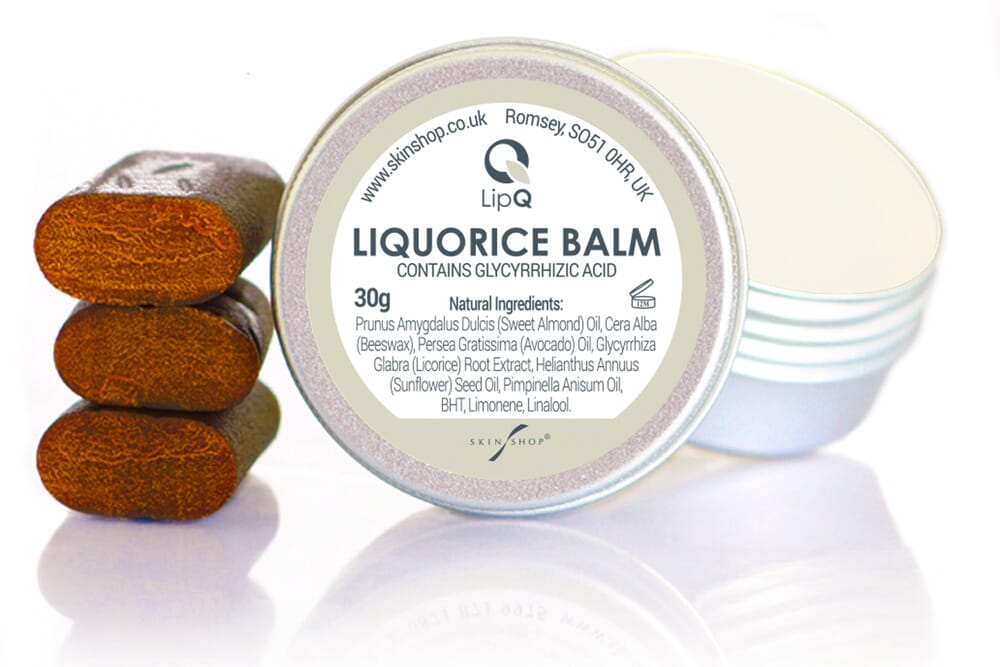 Over the last year the Liquorice Balm has made a huge difference. I use the lip balm every day as a preventative and then I use a slightly stronger Liquorice Rescue Lip Gel at the first sign of a tingle of a cold sore. They both contain an anti-viral natural acid which is found in liquorice root. The combination has reduced not only the length of time my cold sores last but also how often I get them. I am getting far less outbreaks than I used to. They disappear much more quickly now I am using the liquorice lip products and they don’t spread up my nose and they don’t burst open and weep. I recently had a really bad cold over Christmas and for the first time ever I didn’t get a cold sore, which was a miracle.
Over the last year the Liquorice Balm has made a huge difference. I use the lip balm every day as a preventative and then I use a slightly stronger Liquorice Rescue Lip Gel at the first sign of a tingle of a cold sore. They both contain an anti-viral natural acid which is found in liquorice root. The combination has reduced not only the length of time my cold sores last but also how often I get them. I am getting far less outbreaks than I used to. They disappear much more quickly now I am using the liquorice lip products and they don’t spread up my nose and they don’t burst open and weep. I recently had a really bad cold over Christmas and for the first time ever I didn’t get a cold sore, which was a miracle. 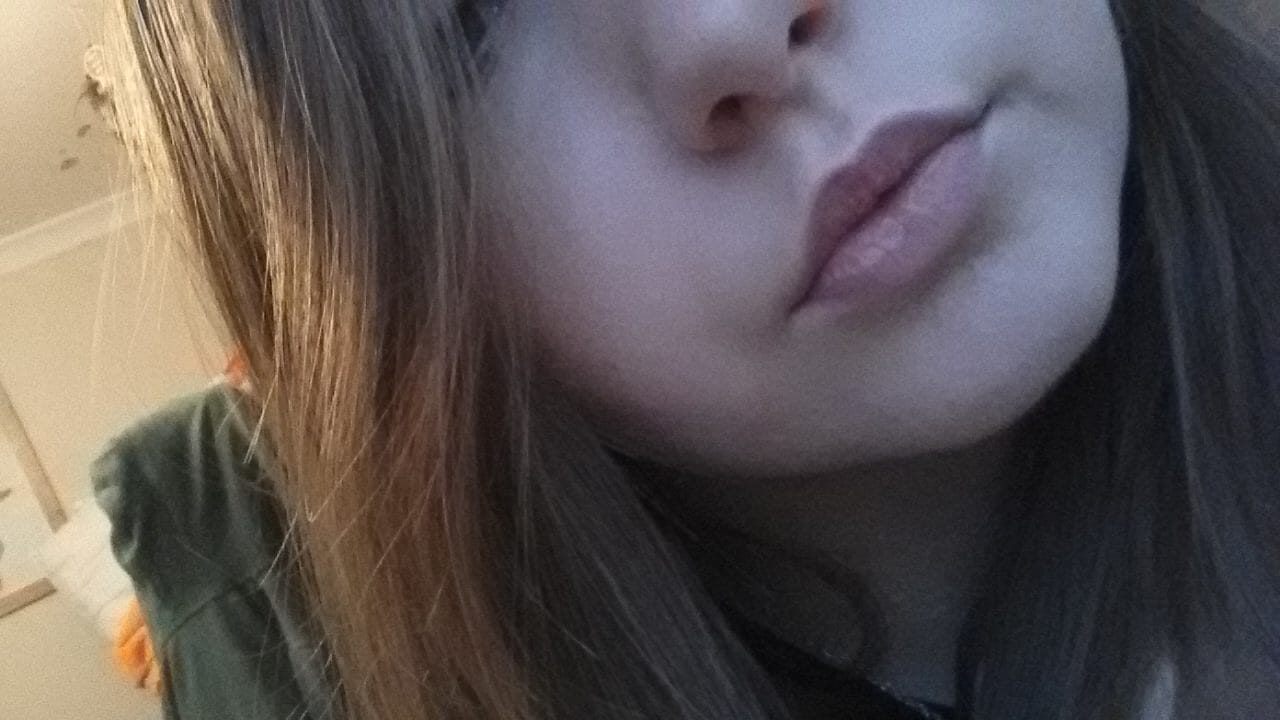 It’s the sense of relief that is the most important thing for me. Getting bad cold sores causes a huge sense of anxiety. I live in fear of when I’m going to the get the next outbreak and how bad it’s going to be. Usually its always at an important time like when we go on holiday, or New Year or when there’s a social event or a group photo. I avoid all photos when I have a cold sore. I only have this one as it was taken for medical reasons to show someone how bad my cold sores were. I generally feel a lot less anxious and insecure now and I don’t feel so shy when I speak and have stopped hiding behind my hand. I still get a few cold sores, I always will as they are with you for life, but they are so much less visible now and they don’t last very long, a few days and they start to go. I feel now I can totally cope with an outbreak as it barely effects my life, rather than being something that took over and that I had to try hard to overcome. Hopefully it’s also going to give me a little more confidence on the dating front too.” Liquorice Lip Balm helps prevent cold sores: study proves successful A lip balm containing an extract of liquorice helps reduce the severity and duration of cold sores better than most conventional cold sore treatments, according to a new study by the Herpes Virus Association. Cold sores are caused by the herpes simplex virus and once you have contracted the virus they can reappear annoyingly. Over 30 million people in the UK are infected with the herpes simplex virus, which can be picked up from a single kiss, and outbreaks of cold sores can vary from as often as once a month to once a year. Several factors have been identified as common triggers for these outbreaks, including hormonal fluctuations associated with the menstrual cycle, stress or an impaired immune system from illness or fatigue. Chapped lips from cold weather can also lead to a cold sore outbreak. Sun is also a major trigger. Treatments for cold sores are generally restricted to topical gels and creams for use only once the actual sores have appeared. There are few treatments available which have a preventative effect on cold sores in between outbreaks. The liquorice lip balm was found to be effective in a double-blind trial, carried out by the Herpes Viruses Association on forty people*. It reduced the severity and duration of outbreaks for over 73% of subjects tested and, furthermore, 83% of subjects using the liquorice balm reported experiencing less severe outbreaks than when using their conventional treatments. While using the liquorice lip balm, testers reported that on average their outbreaks were only half their normal length. Unlike conventional treatments, due to its naturally derived ingredients, volunteers were able to wear the balm at all times without any negative side-effects, meaning that it could be used to prevent outbreaks before they could take hold. The key cold sore fighting ingredient in liquorice is glycyrrhizic acid (GA). GA specifically targets the genes that are required to maintain the virus in its latent state by interfering with the production of special proteins that feed the infected cells. Research published in the US Journal of Clinical Investigation has shown that liquorice has the ability to weaken the cold sore virus which lies dormant in the skin between outbreaks.** Marian Nicholson from the Herpes Viruses Association says; "We were aware of the research on liquorice and were interested in carrying out an in vivo trial. Quite often results which look impressive in a test tube are not as effective in real life testers. However the liquorice balm has performed well with respondents showing a marked reduction in severity and duration of their cold sore outbreaks. In light of this research we are happy to recommend this treatment to our members." Lip Q Liquorice Balm used in this trial is available from Skin Shop at £7.95 for 30g. visit www.skinshop.co.uk ** Licking latency with licorice. J. of Clinical Investigation. March 2005; 115(3):591
It’s the sense of relief that is the most important thing for me. Getting bad cold sores causes a huge sense of anxiety. I live in fear of when I’m going to the get the next outbreak and how bad it’s going to be. Usually its always at an important time like when we go on holiday, or New Year or when there’s a social event or a group photo. I avoid all photos when I have a cold sore. I only have this one as it was taken for medical reasons to show someone how bad my cold sores were. I generally feel a lot less anxious and insecure now and I don’t feel so shy when I speak and have stopped hiding behind my hand. I still get a few cold sores, I always will as they are with you for life, but they are so much less visible now and they don’t last very long, a few days and they start to go. I feel now I can totally cope with an outbreak as it barely effects my life, rather than being something that took over and that I had to try hard to overcome. Hopefully it’s also going to give me a little more confidence on the dating front too.” Liquorice Lip Balm helps prevent cold sores: study proves successful A lip balm containing an extract of liquorice helps reduce the severity and duration of cold sores better than most conventional cold sore treatments, according to a new study by the Herpes Virus Association. Cold sores are caused by the herpes simplex virus and once you have contracted the virus they can reappear annoyingly. Over 30 million people in the UK are infected with the herpes simplex virus, which can be picked up from a single kiss, and outbreaks of cold sores can vary from as often as once a month to once a year. Several factors have been identified as common triggers for these outbreaks, including hormonal fluctuations associated with the menstrual cycle, stress or an impaired immune system from illness or fatigue. Chapped lips from cold weather can also lead to a cold sore outbreak. Sun is also a major trigger. Treatments for cold sores are generally restricted to topical gels and creams for use only once the actual sores have appeared. There are few treatments available which have a preventative effect on cold sores in between outbreaks. The liquorice lip balm was found to be effective in a double-blind trial, carried out by the Herpes Viruses Association on forty people*. It reduced the severity and duration of outbreaks for over 73% of subjects tested and, furthermore, 83% of subjects using the liquorice balm reported experiencing less severe outbreaks than when using their conventional treatments. While using the liquorice lip balm, testers reported that on average their outbreaks were only half their normal length. Unlike conventional treatments, due to its naturally derived ingredients, volunteers were able to wear the balm at all times without any negative side-effects, meaning that it could be used to prevent outbreaks before they could take hold. The key cold sore fighting ingredient in liquorice is glycyrrhizic acid (GA). GA specifically targets the genes that are required to maintain the virus in its latent state by interfering with the production of special proteins that feed the infected cells. Research published in the US Journal of Clinical Investigation has shown that liquorice has the ability to weaken the cold sore virus which lies dormant in the skin between outbreaks.** Marian Nicholson from the Herpes Viruses Association says; "We were aware of the research on liquorice and were interested in carrying out an in vivo trial. Quite often results which look impressive in a test tube are not as effective in real life testers. However the liquorice balm has performed well with respondents showing a marked reduction in severity and duration of their cold sore outbreaks. In light of this research we are happy to recommend this treatment to our members." Lip Q Liquorice Balm used in this trial is available from Skin Shop at £7.95 for 30g. visit www.skinshop.co.uk ** Licking latency with licorice. J. of Clinical Investigation. March 2005; 115(3):591
0 Comment(s)



